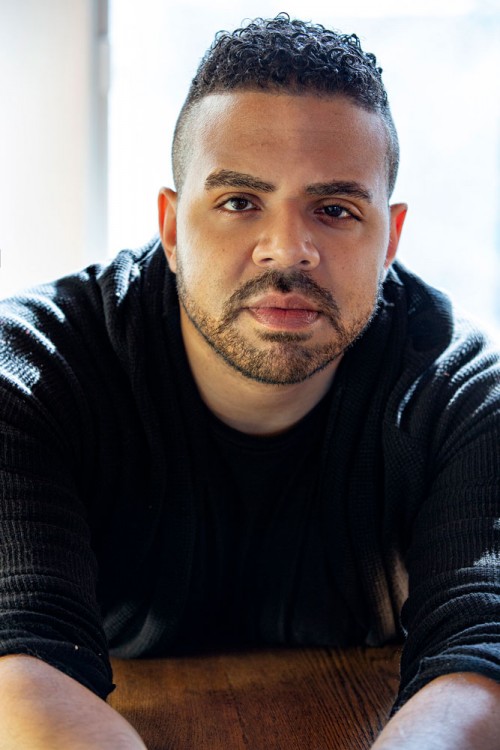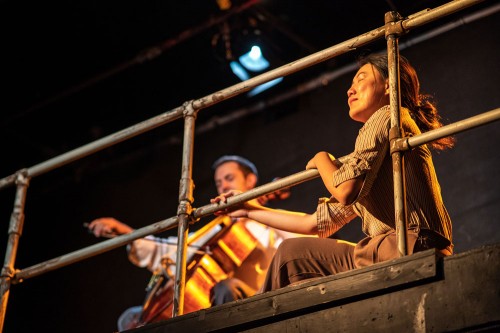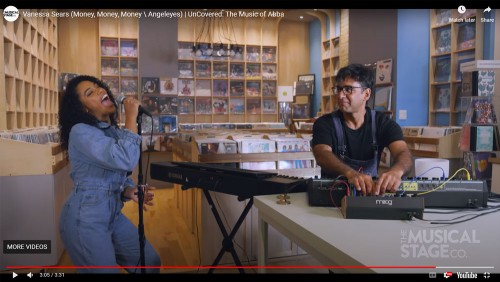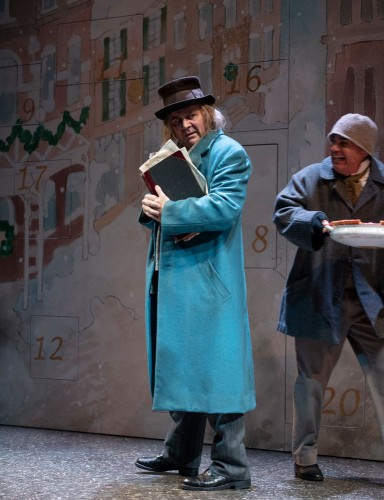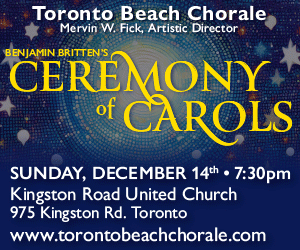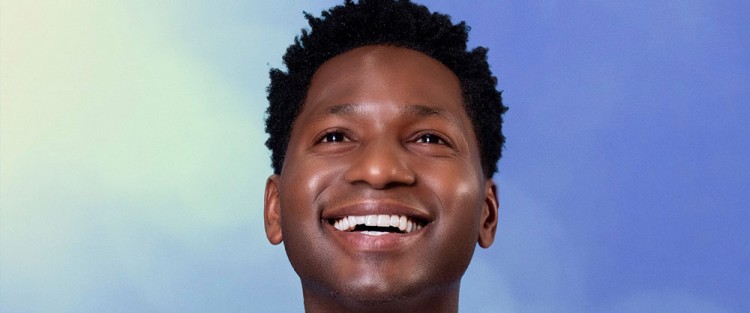 When is a play with music just that, and at what point does it cross some threshold into becoming “music theatre?” This is a question I grapple with all the time but it came up prominently in a conversation about an eagerly anticipated show about to open, and then was brought into sharp relief by two other productions already happening, almost simultaneously, this fall in Toronto.
When is a play with music just that, and at what point does it cross some threshold into becoming “music theatre?” This is a question I grapple with all the time but it came up prominently in a conversation about an eagerly anticipated show about to open, and then was brought into sharp relief by two other productions already happening, almost simultaneously, this fall in Toronto.
Choir Boy
Tarrell Alvin McCraney’s play Choir Boy, presented by Canadian Stage and Vancouver’s Arts Club Theatre, will start its Toronto run on November 8. A hit at London (England)’s Royal Court Theatre when it premiered in 2012, Choir Boy went on to equally acclaimed productions off Broadway, at Chicago’s Steppenwolf Theatre, on Broadway, and a few years ago in Montreal directed by Mike Payette, who will be directing this new production, as well. An Oscar winner for Moonlight, McCraney has been amassing a reputation for brilliant theatrical storytelling, and this play is unique in that it is interwoven with gospel music and R & B sung a cappella throughout the show by the main characters. Having read the wonderful script, I spoke with director Payette as he was on his way from a rehearsal of Choir Boy to the opening of another show at Tarragon Theatre where he has recently taken on the role of artistic director.
One of the first questions I asked him was how he would categorize this play. “Not as the Tonys defined it (a play)!” was his fast reply. In many more ways it could be “considered as a musical, but not a traditional musical,” he said. “The scope of the music is expressed very much by the voices themselves rather than by any instrumentation, as everything is sung a cappella, which is really, really challenging but also incredibly exciting and heightens the overall theatricality.”
Choir Boy is set within the walls of the prestigious African-American Charles R. Drew Prep School for Boys. Pharus, a junior at the start of the play, wants nothing more than to be the leader of the school’s celebrated gospel choir. While his wish comes true, the choir becomes the crucible for all the students for navigating their passage to adulthood while trying to live up to the school goals of becoming strong and ethical men. And here’s where the show crosses that line I mentioned earlier: the songs echo their struggles and hopes to the point where you could not do the play without them.
Payette’s take on the idea is perceptive: “The songs are the core of the storytelling, though in a fundamentally different way from the songs of a traditional musical. Usually songs advance the narrative, but here they speak to a larger spiritual and psychological connection to the characters. That’s not to say that the music doesn’t move the story along, but it has an extra layer because it is so ingrained in the history, and this notion of spiritual, ancestral and generational relationships with the music that all exist within the characters.”
Tied in with the music is a debate ignited by Pharus about the nature of the gospel songs themselves. He believes that whether they were or were not at one time coded messages shared between slaves seeking to escape to freedom, that now they are powerful vessels of spirituality and hope that speak as clearly to him and to his contemporaries as to anyone in the past.
All this makes Choir Boy music theatre in so many ways that Payette’s slightly aggrieved comment about the Tonys takes on added resonance. The 2013 Tony Awards nominated Choir Boy for Best Play, which it didn’t win, but also awarded a special Tony to Jason Michael Webb for ‘his outstanding vocal arrangements’’ – a nod to the fact that this was something more than a play with music.
The play does not, however, come with a score attached – as Payette explained – nor with stage directions. So each production has to create its own score as well as its own staging and choreography. In each case this has to grow directly from the skills and personalities of each cast. In this case, Payette says, “we have cast five remarkable artists and we are essentially building their voices together into a choir depending on their ranges. The music will be unique. The choreography as well, is specific to the skills and personalities of this cast. It is a completely new production every time.”
Speaking of the power of the play and why he wanted to do it Payette continued, “The voice of the story is so clear: from the intersectionality of classes, of queerness, of masculinity, of brotherhood, of community and, at its core, the need we all feel to aspire to something greater than we are. I think it will touch many people in ways we have in common, and that is the kind of art that we need now.”
And what kind of art is that? Well, with the music itself, the way he describes it here, as much a living character in the play as any of the individual players, it sounds a lot like music theatre to me.
Indecent and The Year of the Cello
The two shows I’ve just seen offer contrasting additional perspectives on the play-with-music vs music theatre divide.
The first, Paula Vogel’s 2013 play Indecent presented by Studio 180 and Mirvish at the CAA Theatre, was advertised as “combining music, song, dance and comedy” to tell the true story of how Solomon Asche’s Yiddish play God of Vengeance went from being a cultural smash across Europe (and New York’s Greenwich village in its original language), to being an infamous debacle on Broadway (with its story gutted and script translated into English) – to such an extent that the entire cast was arrested and jailed overnight for obscenity, and the show closed down. The story itself is fascinating, the tale of a groundbreaking play of the very early 20th century that dared to depict not only a religious Jewish man owning a brothel, but a moving lesbian love story between the man’s daughter and one of the “girls”. Vogel’s version of this history highlights the bravery of young playwright Asche and the transformative power of his writing – and therefore of all theatre on those who come across it – as well as the innate power of art and artists to survive the most horrific of times.
Music – wonderfully evocative klezmer music, played live – is used throughout the show to create the cultural and historical context. Apparently Vogel wrote her play by choosing specific pieces of music to inspire each scene or section of the piece as she was writing. In spite of this importance to the production of the music and music choices, I still felt on seeing it, though, that this was a play with music not music theatre, by which I mean that the story could have been told without the music and still have had its own power. (Indecent continued its run at the CAA Theatre until November 6.)
The second show, The Year of the Cello, is a brand-new work created by Theatre Passe Muraille artistic director and playwright Marjorie Chan with Music Picnic artistic producer and composer Njo Kong Kie. Presented in TPM’s newly renovated but still tiny Backspace, the setting was claustrophobic – perhaps intentionally, as the story we were immersed in was taking place in an apartment block in 1930s Hong Kong.
In essence a duet for actor and cellist, it reminded me, inevitably, of Tapestry Opera’s premiere of Luna Woolfe’s operatic two-hander Jacqueline in 2020, a haunting duet for soprano and cellist about Jacqueline du Pré. In the case of The Year of the Cello (which is equally haunting, the performer is an actor, the talented Rong Fu, playing Wen, who shares with the audience the story of her growing up with best friend Li-An, surviving the plague that decimates the city and falling in love, only to lose her best friend to a cellist – played on opening night by Bryan Holt (one half, with Amahl Arulanandam, of edgy cello duo VC2).
The wonderful experiment at the heart of this creation/production is that while the cellist is played by a cellist, he never speaks, only his cello does – and this is exactly right, for at the heart of the story is how Li-An’s heart is stolen by the music, by the sound of the cello heard across the streets of Hong Kong. We hear how she is drawn to it as if to a pied piper and how, when the cellist leaves, her only respite is to play records of cello music, notably Bach, over and over. We hear the Bach played live by the cellist as if in the time past, and even more powerfully (though perhaps taking a trifle too long) we hear the story of his love for Li-An in a new composition as he regains his ability to play after reconnecting with Wen. Is this music theatre? Definitely, yes. The show would not work without the music which is, in effect, as it is in Choir Boy, a character of its own in the story, evoking not only the past but the potential future for the characters we have come to care about. (The Year of the Cello played until October 29).
OCT 25-NOV 27: Tina Fey’s Mean Girls, the musical, comes to the Princess of Wales Theatre on the heels of the stage version of the iconic Singin’ in the Rain. Fey has turned her teen cult classic movie into a popular Broadway musical that promises to provide a fun night out. Casey Nicholaw (Drowsy Chaperone) directs.
NOV 4-13: The devoted following of the St. Anne’s Music and Drama Society in Toronto’s West End will be delighted to know that MADS is coming back from their pandemic shutdown with a live production of a lesser known Gilbert and Sullivan work: The Sorcerer.
NOV 8-10 (Koerner Hall): Music director and master music arranger Reza Jacobs bids farewell after 15 years to the UnCovered concert series this year with UnCovered: The music of ABBA, the Musical Stage Company’s annual celebration of songs as vehicles of story. A new mix of actor-singers will perform with the live band this year, including the always luminous Vanessa Sears.
NOV 9-20: The Golden Record. Mike Ross, Soulpepper’s Slaight Family Director of Music, brings back the company’s superb song-and-storytelling concert series with a new show inspired by NASA’s “The Voyageur Golden Record”, a phonograph message that NASA sent out into space in an effort to communicate the nature of our world to any extraterrestrials who might find it. The usual band of expert singing storytellers reunites, joined by writer Sarah Wilson and tap dancer Travis Knights.
NOV 11-13: Kaeja d’Dance, 31 (TouchX + I am the Child of) presented by Harbourfront Centre as part of the Torque dance series. The Kaejas celebrate 31 years as part of the Toronto Contemporary Dance scene with these two very personal new works.
NOV 9-DEC 23: For those wanting to celebrate the holiday season early the Shaw Festival is bringing back its very musical A Christmas Carol beginning on November 9, as well as a new large-scale production of Irving Berlin’s White Christmas on November 18. White Christmas will be directed like last year’s hit Holiday Inn, by Kate Hennig, and choreographed by the wonderfully imaginative Allison Plamondon. Both shows run until December 23.
Jennifer Parr is a Toronto-based director, dramaturge, fight director and acting coach, brought up from a young age on a rich mix of musicals, Shakespeare and new Canadian plays.


